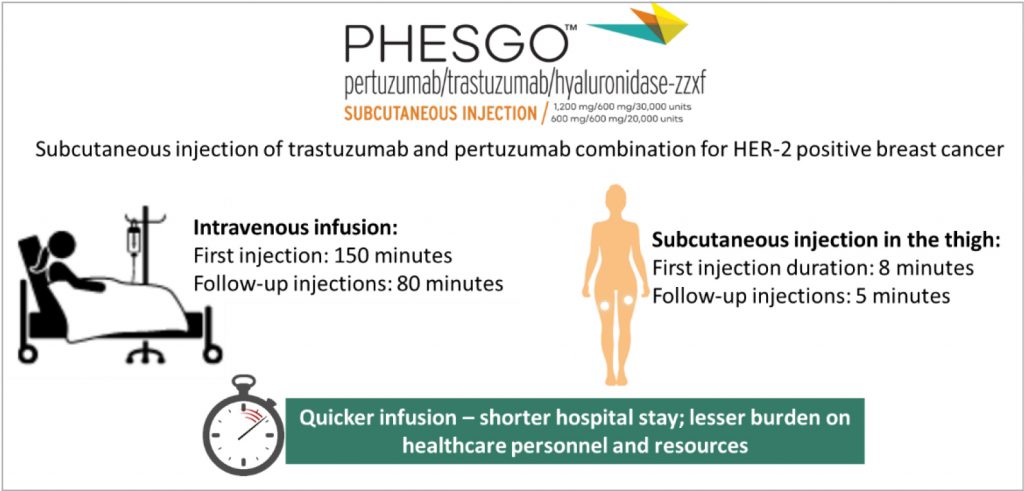Patient friendly drug delivery – Adapting to the new normal & sustainable impact
Healthcare delivery ecosystems across the world were the hallmark of resilience all through 2020. Delivering care in the new normal called for all stakeholders to adapt. Especially so, in the case of chronic care, emergency care and care for immunocompromised patients. As we wade out of the woods, we are excited about the sustainable impact of innovations that the new normal accelerated.
Patient convenience was at the heart of drug delivery innovation that COVID-19 catalyzed. The last nine months witnessed accelerated development effort and approval of several oncology drug formulations that can be administered with substantially shorter infusion times reducing length of hospital stay or can be administered at home. An indicative example is Genentech’s July 2020 FDA approval for PhesgoTM , a subcutaneous injection of trastuzumab and pertuzumab that can be delivered in less than 8 minutes as compared to the conventional 80 minutes intravenous infusion. While the move also represents lifecycle management to ringfence from biosimilar competition, patient convenience and health-economic benefits are here to stay as drivers of formulation innovation. We have covered about it in detail in our PharmForward post here.

Celltrion, a company with a focus on bio-betters as a strategy for a competitive branding, received EMA nod for its subcutaneous infliximab biosimilar – the first in the world – making a remarkable improvement over the current intravenous infusion formulation to provide patients more control and flexibility over their treatments for various auto-immune conditions.
 These innovations and improvements in formulation was not limited to biosimilas as two biologics – Kesimpta (ofatumumab) and Ocrevus (ocrelizumab) were introduced in a self-administered and quicker infusion versions respectively for Multiple Sclerosis. Both drugs target B-cells and bind with them to prevent auto-immune mediated damage on the nerve cells.
These innovations and improvements in formulation was not limited to biosimilas as two biologics – Kesimpta (ofatumumab) and Ocrevus (ocrelizumab) were introduced in a self-administered and quicker infusion versions respectively for Multiple Sclerosis. Both drugs target B-cells and bind with them to prevent auto-immune mediated damage on the nerve cells.
 In October 2020, Alexion was granted approval for a new version of its block-buster drug Ultomiris for paroxysmal nocturnal hemoglobinuria (PNH) and atypical hemolytic uremic syndrome (aHUS). This new version has a shorter infusion time – 60% lesser than the existing 10mg/ml version. This is particularly pertinent in the current COVID-19 context where hospitals are already stretched to capacities, patients would be hesitant for longer hospital stays and therefore the quicker acting versions of critical drugs would be highly welcome.
In October 2020, Alexion was granted approval for a new version of its block-buster drug Ultomiris for paroxysmal nocturnal hemoglobinuria (PNH) and atypical hemolytic uremic syndrome (aHUS). This new version has a shorter infusion time – 60% lesser than the existing 10mg/ml version. This is particularly pertinent in the current COVID-19 context where hospitals are already stretched to capacities, patients would be hesitant for longer hospital stays and therefore the quicker acting versions of critical drugs would be highly welcome.
While the catalyst COVID-19 will be behind us, the sustainable impact of this trend will be far reaching. We are highly encouraged by the propelling forces for this momentum around delivery innovation and patient centricity – these are telling examples of the power of stakeholder collaboration. While industry has responded with agility and sustained investments, regulatory impetus and support has provided the tailwinds. We kick off 2021 on this formidable foundation of innovation momentum. Spotlight: Patient centricity – in 2021 and beyond.
 Grow Beyond
Grow Beyond 

